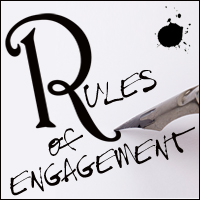.
 A notebook for fiction writers and aspiring novelists. An editor’s perspective.
A notebook for fiction writers and aspiring novelists. An editor’s perspective.
• Next post • Previous post • Index
.
Finding Your Voice (Part 3.)
Point of View: Narrative vs. Authorial Voice
A.K.A.: First Person (1P) vs. Third Person (3P). It’s a bigger issue than me or him.
Note: Various writing teachers/critics refer to narrative and authorial voice as an author’s Point of View (POV). However, as not to confuse an author’s own voice with the author’s characters’ voices, I shall refrain here from using POV, and simply refer to narrative or authorial voices as first person or third person, respectively.
The Narrative Perspective concerns a story’s POV (Point Of View), essential information that will greatly influence the tone and tenor of your novel. Who is telling the story—you, the author, or one or more or your characters speaking through you? Might you also choose to impart an all-knowing, omniscient voice to further describe your characters? And when is your story told? (Now or then?) All relevant questions to ask yourself before you begin to write.
Your options? A list of common perspectives:
- First person/past tense (e.g.; your narrator’s voice): I loved Paris.
- First person/present tense: I love Paris.
- Third person/past tense. (e.g.; authorial voice): She loved Paris.
- Third person/present tense: She loves Paris.
Less relevant and not recommended (except as dialog or inner monologue, as these styles cannot wholly sustain a fictive work):
Third person/omniscient/present conditional): She would one day find love in Paris.
- First person/future tense: I will love Paris.
- Second person/past tense: You loved Paris.
- Second person/present tense: You love Paris.
- Second person/future tense: You will love Paris.
Also note the possible sub-categories when writing in Third Person. (BTW, Omniscient = having unlimited knowledge and awareness).
.
- Third Person Omniscient: The narrator functions as an omnipotent being, knowing all characters—past, present and future—their inner thoughts, moods, motivations, personalities, secret desires, as well as external dialogue and actions.
-
Third-Person Limited: The narrator has omnipotent knowledge of a single character (typically a protagonist/main character) and does not reveal inner thoughts/motivations/intentions of other characters. This voice is somewhat similar to writing in First Person, the writer focusing on a sole character to tell the story, although with occasional authorial assistance.
-
Third-Person Objective: The narrator is an unbiased observer (a fly on the wall, as they say), typically revealing your characters, external words or actions, yet oblivious to any internal monologues or motivations. 3P Objective is the most distanced stylistic approach, allowing readers only external glimpses into your characters’ motivations and intentions.
Finding one’s own narrative perspective—that is, writing a novel in first person (1P) vs. third person (3P)—is a bigger issue than simply writing “I walked to town” or “She walked to town.” You’ll likely find that your sentence construction, your cadence—possibly your entire plot structure—significantly different, depending on which voice you choose. Visual cues will differ. Character depth will differ, your character’s inner thoughts playing a prominent role. Character motivations may differ in terms of your reliance on dialog (two characters communicating) versus internal monologue (a character thinking unspoken thoughts to which the reader is privy). You may find your entire writing style shifting to some degree, to accommodate the voice you choose.
BTW, Jay McInerney wrote the entirely of Bright Lights, Big City in 2nd person. The novel begins: You are not the kind of guy who would be at a place like this at this time of the morning… This voice can sustain a novel—McInerney’s is a very good novel—but not easily and probably not without being regarded by your literary peers as ‘effusive.’ So, no, if you’re new to novel writing, probably don’t use it.
When writing in 1P, using a narrative or narrator’s voice, you’re restricted to solely using the “I” character to impart knowledge to the reader. Mary may be thinking about killing me, but I don’t know that for certain. Only your principal character will reveal thoughts to the reader—an attribute that can be both incredibly illuminating and restricting. If you’re writing in 1P, you’re allowing the character to speak directly to the reader. For instance, Barbara Kingsolver begins her novel The Bean Trees:
. . . . I have been afraid of putting air in a tire ever since I saw a tractor tire blow up and throw Newt Hardbine’s father over the top of the Standard Oil sign. I’m not lying. He got stuck up there.
However, should you, as author, choose to tell your story from your own perspective, you’re speaking in authorial voice. You’re writing in 3P, typically in either past or present tense. In the novel Prodigal Summer, Kingsolver begins:
. . . . Her body moved with the frankness that comes with solitary habits. But solitude is only a human presumption. Every quiet step is thunder to beetle life underfoot; every choice is a world made new for the chosen. All secrets are witnessed.
. . . . If someone in this forest had been watching her—a man with a gun, for instance, hiding inside a copse of leafy beech trees—he would have noticed how quickly she moved up the path and how direly she scowled at the ground ahead of her feet.
Using authorial voice, you have the added bonus of alternating with—should you choose—an omniscient voice. As omniscient narrator, you’re essentially a puppet-master looking down upon your characters and providing the reader with an objective overview of their lives. Interestingly, in Prodigal Summer (above), Ms. Kingsolver shifts to present tense to reflect her omniscient voice in the second line.
Remember the Stage Manager in Thornton Wilder’s play Our Town? (It’s been a high-school staple for decades.) Mr. Wilder ingeniously offers his omniscient voice a living stage persona, a character unseen and unknown by the other actors. Early in Act I, the Stage Manager states: “Over there is the Congregational Church; across the street’s the Presbyterian. Methodist and Unitarian are over there.” The Stage Manager is not speaking to the actors. He’s speaking to the audience. The actors are oblivious to the Stage Manager’s presence.
Another example—and advantage—of writing in 3P is switching freely between authorial voice and omniscient voice (in bold):
As Jonathan stumbled through the steaming Manaquirian jungle, he felt a sudden stinging sensation on his shoulder. Christ, he hated mosquitoes. He considered them little more than tiny, insufferable vampires, sucking the lifeblood from any creature who dared enter their blistering realm. Little did Jonathan know that the bite of the Peruvian Aedes Aegypti would infect him with a lethal strain of malaria that would, without an antidote, inexorably dissolve his brain into a soggy beef broth. The nearest medical facility, in the village of Manaus, remained a good fifty miles distant.
It can be a nice way to build drama.
If you write in 1P, do realize that we, your readers, won’t know (until Jonathan himself tells us) that his brain is turning to mush. If Jonathan doesn’t know, we don’t know either. However, there exists subtle methods to invoke a similar sort of faux omniscient information. No, you’re not using omniscient voice. You’re cheating by creating a useful backstory. Or hearsay. Or conversations with convenient strangers. Thus:
As I stumbled through the steaming Manaquirian jungle, I felt a sudden stinging sensation on my shoulder. Christ, I hated mosquitoes. They’re insufferable buggers, little more than tiny vampires sucking the lifeblood from any creature who dares enter their blistering realm. Years ago, while camped in Tupana, I’d heard horror stories about a rare killer mosquito hiding in this part of the Amazon. It was a new breed of insect whose sting would slowly dissolve a human brain into a soggy beef broth. I hoped to God one of those little lethal bastards wouldn’t find me, as the nearest medical facility, and the nearest antidote, awaited me in Manaus, a good fifty miles away.
Different voice? Sure, and likely a different style, subliminal or not. For instance, I didn’t intend to alter the above translation (3P/1P), but each voice demands nuance and subtlety. It’s not as simple as switching from him to me. Your novel will be built around the specific voice you use.
However, my own personal guideline is this: When writing a story based on a single character’s quest and specific insights, I’ll usually choose First Person. It’s a familiar coming-of-age or heroes-journey voice, filled with introspection and often deep (or eclectic) inner monologues. If a character’s particularly mesmerizing or charming, I’ll allow that person to guide readers throughout the story.
If I’m envisioning a large cast of characters, each with an intriguing personality, or various, dissenting characters with ripe potential for dramatic conflicts, that’s definitely Third Person material. I can switch between personalities, timelines, and story arcs at will, building an epic saga with multi-dimensional, or -generational protagonists and antagonists.
So… not sure which voice to use? Might I suggest allowing yourself to draft a few pages, trying out different personalities and perspectives? Write a scene in 3P and then rewrite those same pages in 1P. Try past tense. Try present tense. Does a particular voice call to you? Do you feel yourself able to better express yourself more articulately using a particular voice? Personally, I find this exercise to be one of the more enjoyable guilty pleasures of beginning a new book.
.
• Next post • Previous post • Index
.
.
.




 by
by 


 Small Press Bookwatch is a publication of the
Small Press Bookwatch is a publication of the